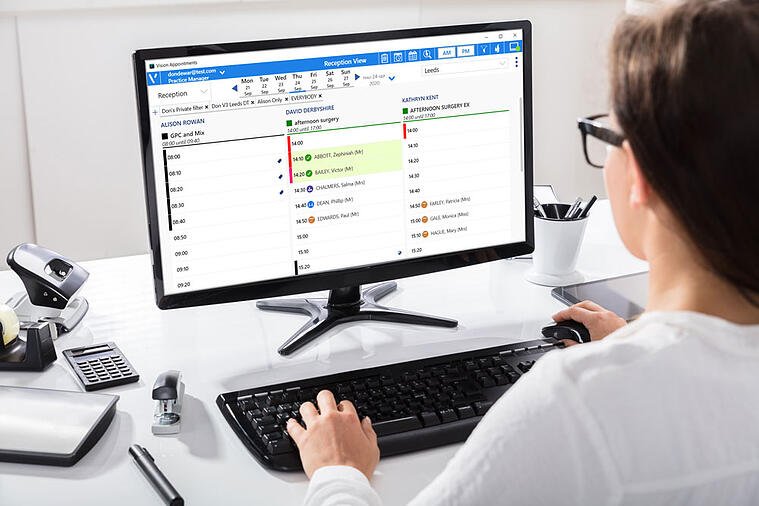

By Tony Thorne
On Nov 11, 2021
Read time
4 minutes
Reinforcing Support for Shared Care with Linked Appointments
As the demands on primary care continue to escalate, technology can – and should – play a vital role in enabling joined up care and maximising the available time and resources. Cegedim is committed to working closely with both practices and shared care services to understand where support is needed and identify additional functionality that provides real, on the ground benefits. We also liaise with the national bodies in each country to keep up to date with the future needs of healthcare and how the landscape and technology needs to adapt.
Shared care services are, of course, high on the agenda right now – and all of the intelligence we have gained feeds into the development of all Cegedim Health Solutions applications including Vision Anywhere, Tasks, Community, Vision 3, Outcomes Manager and Appointments. The latest enhancements to Appointments, including Linked Appointments and Import Patient Lists, further reinforce the power of Appointments to transform the speed and ease with which PCN or Cluster Services can both extend shared care services and streamline the management of patient/ clinician interaction.
Supporting Shared Care
One of the key requirements for seamless shared care across a PCN or cluster is the ability to book patients quickly and efficiently into different services across the wider team.
As many practices have discovered, without a system agnostic appointments solution that enables patient appointments to be booked irrespective of the system being used by the specific service, shared care goals are tough to achieve. A PCN or cluster will struggle both to provide patients with extended access to services and also scale up the service to support roles such as Clinical Pharmacist, Social Prescriber and Mental Health Practitioner.
Anyone involved in delivering joined up patient care, from reception staff to clinicians, needs fast access to patient information. Yet many practices are still struggling to book patients into the services that are available. The only option is often to make a special booking and use free text to record the patient’s name – which is the only information available to the clinician. No access to the patient’s record, their attendance history or additional information such as the need for physical support to attend the surgery.
Cross System Solution
Appointments is not constrained by any system – it works at a higher level to enable patient appointments to be booked irrespective of the clinical system being used. With a direct link to full clinical records, it also provides clinicians with all the information they need, including other scheduled and future appointments, as well as appointment and attendance history.
We have just released additional functionality – Linked Appointments – which links a patient’s series of appointments across multiple settings for services requiring multiple visits. The linked appointments can be seen across organisations, ensuring multi-disciplinary teams (MDTs) have full visibility of a patient’s planned – and experienced – treatments throughout the care process.
In addition to MDTs, there are a number of practices and shared services that will benefit from the ability to link appointments in this way, including immunisations, where babies’ multiple jab appointments can be linked to provide a complete view of the course. Or wound care, where a series of appointments will be required to manage the treatment process; or problem management – such as alcohol or weight management – where different resources are likely to be involved, including counselling and social prescribing.
The ability to use Linked Appointments in both practice and shared working environments provides vital visibility to the wider care community involved in often complex joined up care situations.
Appointments can be added or removed throughout the process, as required, to provide the correct level of care. Should an appointment be cancelled or rescheduled, warnings are accessible to highlight any changes and SMS updates can be sent to the patient.
Improving Control
In addition to the ease of adding registered and non-registered patients to Appointments and their clinical records opened directly from the app as per the service data sharing agreement, simple Import Patient Lists is further supporting both practice and shared care.
It makes it far quicker and less onerous to manage patient lists for the flu campaign, Covid boosters, medication reviews and disease management for example, by enabling practice registers to be imported into the shared care appointments list and then back to the practice for any follow up appointments as required.
Plus, with Appointments directly accessible from the Desktop, the entire extended shared care network can be confident of accessing information as and when required, including those who do not need access to the clinical system. Staff in shared care hubs for extended hours, PCN or Cluster services including medicines management, social prescribing, clinical pharmacists can also access the information required – even if the HSCN or other network connection is disrupted.
Managing Resources
Appointments also supports practices and service teams in managing resources and understanding how services are responding to patient demands. Utilisation and availability can be easily viewed across a number of weeks and clinicians so resources can be managed accordingly.
As PCNs and clusters continue to expand the delivery of shared care services, the process has to be reliable, effective and visible. With Appointments, not only can patients be rapidly booked into the right services but everyone in the extended care environment can immediately see the full information – including linked appointments – to understand often complex care scenarios.
With the benefits of additional reporting to provide insight into service provision, PCNs and Clusters have a robust solution that can support the further expansion of shared care services to deliver joined up patient care.
A number of set reports are available for easier management and new ones quickly created and viewable in graphs and pie charts or the patient data exported to .csv.

